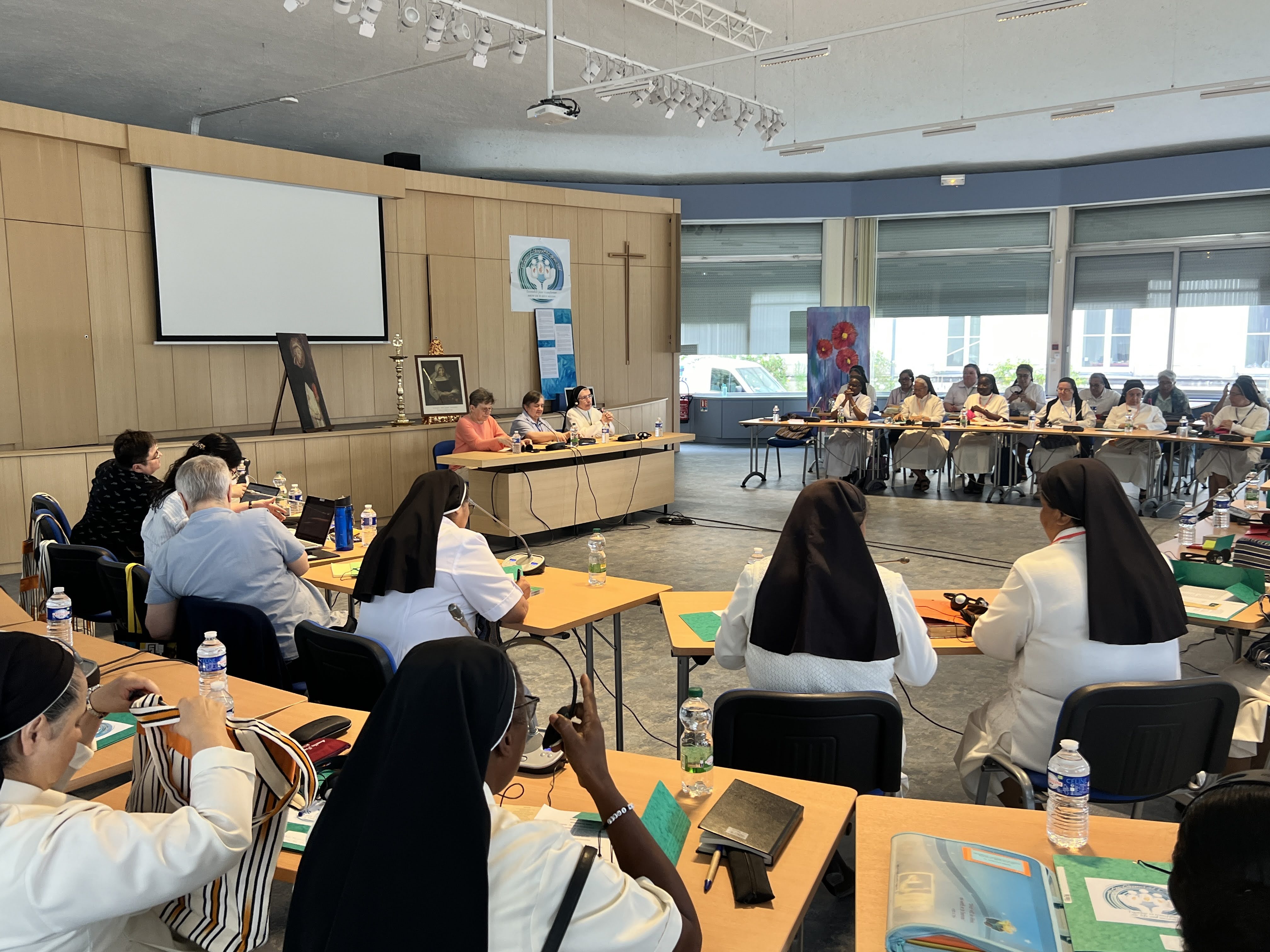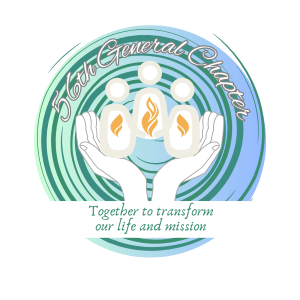A day to organize
- by Dominicas
-
in News
-
Hits: 1023

La Grande Bretèche (Tours), 07/11/2024, Sr. Gemma Morató i Sendra / Photos: Sr. Conchi García Fernández.- A chapter does not start immediately; it needs to oil and adjust all the gears, and today has been that day.
At 9:15 am, the assembly met for the first time in the chapter hall in the auditorium to address practical matters. The day began with a prayer through a song by the group Gen Verde that was projected. Immediately afterward, the translators and Sister Rosalie Yanogo, who will assist Sister Ana Patricia Londoño in the secretariat, were introduced.
Perhaps the most laborious task of the morning was coordinating the translations in the three languages. The work of the sisters in charge of this mission will not be easy; we already appreciate their good disposition and willingness to work. The translators are Sisters Amanda Mancipe, Amanda Mesa, Claudia Rubalcava, Marceline Ouédraogo, Reetha Mechery, and Vanesa Villalobos.
Additionally, efficient logistics are required, and for that, we rely on Sisters Amala Mary, Emily P., Jenat Mary, Virginie Dolebzanga, Mélanie Kéré, Patricia Yaméogo, Marie Jean de la Croix, Anne Marie Enrione, and Anne Marie Enderlin. The Vice-Province of Africa gifted everyone with a beautiful handmade folio bag.
Sister Véronique Margron, provincial superior of Europe, welcomed everyone with a beautiful speech, which we share below. Her words of encouragement and the memory of what was experienced ten years ago elaborated on the theme of the chapter, advocating for listening and dialogue. Then, an excellent way to test the translations was to introduce ourselves by structure.
The Eucharistic celebration was presided over by the parish priest of the Mother House sector, Guillame Morin. In his homily, he highlighted that the feast of Saint Benedict was an ideal day for the first day of the chapter and emphasized what we mentioned in yesterday's article and what Sister Véronique also conveyed in the morning. Perhaps this Mother House, so renewed and transformed, will deeply inspire this 56th General Chapter, whose official opening will be tomorrow.
Lunch was preceded by an aperitif shared with the sisters of the house in the winter garden, and then we proceeded to the meal.
The afternoon began with a prayer to Marie Poussepin, and then thanks were given to Mrs. Nathalie, the cook of 106 community in Paris, helped by mr. Thierry for having prepared a festive lunch. Next, the proper procedures of the chapter were reviewed and explained, especially because there are several capitulars participating for the first time. We also started thinking about the names of the sisters who might assume specific responsibilities in the chapter, such as the coordination commission or the moderators, etc.
With the evening prayer, we finish this day of preparation for the solemn opening tomorrow. May the Holy Spirit accompany us.
Welcome from Sister Véronique Margron, Provincial Superior.
Welcome words from Sister Véronique Margron, provincial superior
Dear sisters:
Here you are in your House. In this common house that is our Mother House. A house marked by memory, by history since 1848, but also open to the present day of the Congregation, of the city of Tours, of the local Church, of Dominican life and looking to the future.
I am happy to welcome you on behalf of the sisters from Belgium, Spain, Jerusalem and France who now form our Province of Europe.
Welcome to each of you.
I am happy to welcome you to this beautiful house, which has been transformed without - I believe - losing its soul.
Some of you here today will remember, because you were in this same room 10 years ago: we voted, not without some pain, for the project to transform La Bretèche, with the opening of an EHPAD (Establishment for Elderly people) in particular. But we didn't know at the time that this decision would lead us in this direction.
So, 7 years of non-stop work.
Over the course of these 7 years, more than a dozen major projects were carried out:
Preparatory work and construction of the new archives, and their transfer to allow the opening of the neighboring Ehpad site.
Complete renovation of the heating system throughout the house and in the St Thomas home.
Renovation of all the plumbing.
Renovation of the auditorium, where we are now.
Creation of a museum reception area in the rotunda.
Creation of the Marie Séraphie workshop.
Creation of studios in the former drying shed, which was completely restructured for the project.
Creation of the wonderful small chapel in the large chapel.
Creation of a contemporary meeting room in the winter garden.
Renovation of the roofs.
And finally... the renovation of the Sainte Catherine Building, the central building, in less than a year.
Nearly 100 companies and no doubt between 400 and 500 workers took turns here.
It's all splendid, and we've been able to achieve it thanks also to the sisters of the House who have agreed to all these changes, disturbances and novelties over the years. Thanks to all these companies and thanks to Mr Xavier Pats, the assessor of the Congregation, the linchpin of all these projects with his unrivalled skills. Thanks also - and above all - to the fact that we had the necessary financial resources.
These are very big changes.
So what makes it a transformation, or not? In the sense of the theologian and psychologist Ted Dunn and in line with one of the themes of our General Chapter?
What makes transformation:
- Already the consent to the fact that things, here and elsewhere, could not remain identical, unless one day we let them wither away and no longer correspond to the life open to others, worried about others. Unless we no longer respond to that primary Christian vocation: hospitality.
- The first condition for transformation is not to be in denial. Facing reality head-on, in the awareness that our vulnerability can become an opportunity for risky and daring decisions. Decisions whose possible consequences are beyond anyone's control. But if we don't, we'll probably die a little sooner.
- Another condition, I believe, is a long-term commitment, dialogue, listening, mutual trust between the sisters, the government of the Province and the General Government, what we now call synodality.
- Then there's the ability to be surrounded by expertise and advice, while remaining open to other opinions and proposals.
We have tried to do all this, in this House and elsewhere, as much as possible. Sometimes well, sometimes not so well. With successes and failures.
But then, only life can and will tell whether we have in some way undertaken a genuine transformation, from the very heart of our vulnerability, or even thanks to it. The life that comes from others, in the service of others, will tell us: today the life of the women - including our sisters - and the men in the EHPAD; tomorrow those and two in the independent residence. The lives of the sisters at La Bretèche. The lives of the men and women who work and collaborate with us. And the lives of all those who pass through this house, for meetings, for visits, for prayer.
Finally, we ourselves will perhaps be able to bear witness to a transformation if we feel that what is being done is at the service of our own breath, our impetus, our taste for friendship at this time and at the service of the Gospel of Christ.
We will be transformed to the very extent that we understand that it is the Gospel that comes to us in our encounters with one another, and that everything that is done finds its meaning there.
Good General Chapter!
Véronique Margron, op
Provincial superior of Europe



